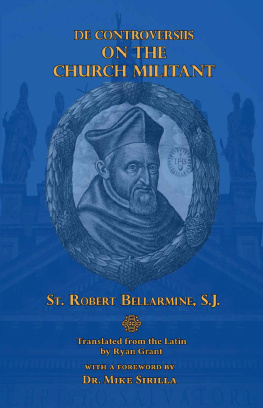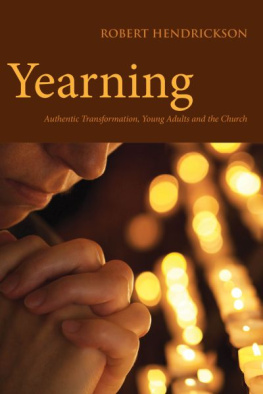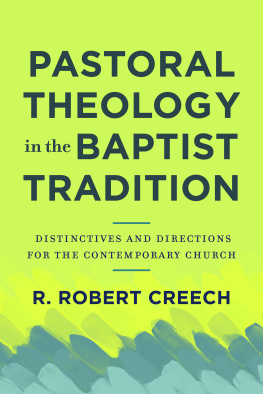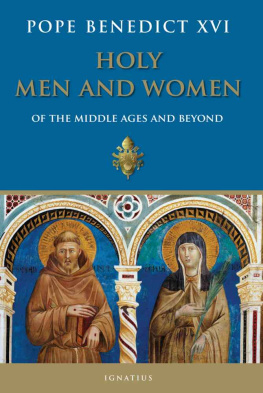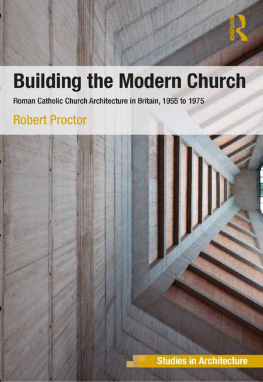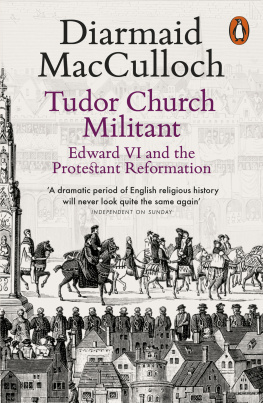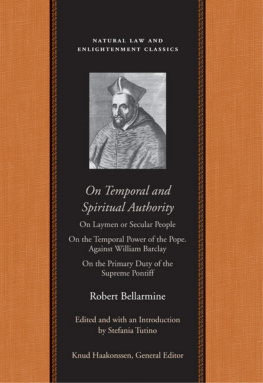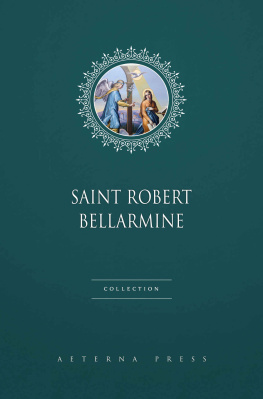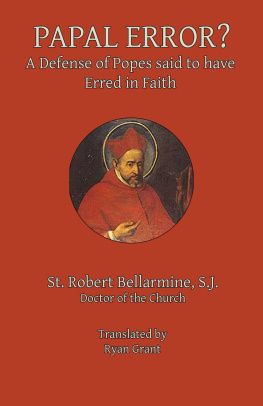Robert Bellarmine [Bellarmine - On the Church Militant (De Controversiis)
Here you can read online Robert Bellarmine [Bellarmine - On the Church Militant (De Controversiis) full text of the book (entire story) in english for free. Download pdf and epub, get meaning, cover and reviews about this ebook. year: 2016, publisher: Mediatrix Press, genre: Religion. Description of the work, (preface) as well as reviews are available. Best literature library LitArk.com created for fans of good reading and offers a wide selection of genres:
Romance novel
Science fiction
Adventure
Detective
Science
History
Home and family
Prose
Art
Politics
Computer
Non-fiction
Religion
Business
Children
Humor
Choose a favorite category and find really read worthwhile books. Enjoy immersion in the world of imagination, feel the emotions of the characters or learn something new for yourself, make an fascinating discovery.
- Book:On the Church Militant (De Controversiis)
- Author:
- Publisher:Mediatrix Press
- Genre:
- Year:2016
- Rating:3 / 5
- Favourites:Add to favourites
- Your mark:
- 60
- 1
- 2
- 3
- 4
- 5
On the Church Militant (De Controversiis): summary, description and annotation
We offer to read an annotation, description, summary or preface (depends on what the author of the book "On the Church Militant (De Controversiis)" wrote himself). If you haven't found the necessary information about the book — write in the comments, we will try to find it.
Robert Bellarmine [Bellarmine: author's other books
Who wrote On the Church Militant (De Controversiis)? Find out the surname, the name of the author of the book and a list of all author's works by series.
On the Church Militant (De Controversiis) — read online for free the complete book (whole text) full work
Below is the text of the book, divided by pages. System saving the place of the last page read, allows you to conveniently read the book "On the Church Militant (De Controversiis)" online for free, without having to search again every time where you left off. Put a bookmark, and you can go to the page where you finished reading at any time.
Font size:
Interval:
Bookmark:
Contents
DE CONTROVERSIIS FIDEI CHRISTIANI
D E E CCLESIA M ILITANTE
DIFFUSA PER ORBEM TERRARIUM
O N THE C HURCH M ILITANT
DIFFUSED THROUGHOUT THE WORLD
by
S T. R OBERT B ELLARMINE , S.J.
Doctor of the Church
Translated from the original Latin by:
Ryan Grant
M EDIATRIX P RESS
http://www.mediatrixpress.com/
MMXVI
Copyright Information
Translated from De Controversiis Fidei Christiani, contra haereticos nostri tempori, tomusprimus, De Ecclesia lib. 3.
Ingolstadt, 1588
Sartorius Publishers
First Edition, June 2016
Mediatrix Press
http://www.mediatrixpress.com
Ryan Grant, 2016.
This work may not be reproduced for commercial purposes; it may not be distributed in electronic form oras a whole without express permission.
FOREWORD
M ICHAEL G. S IRILLA , Ph.D.
Franciscan University of Steubenville
S
T. R OBERT B ELLARMINE (15421621), a preeminent and officially-recognized Doctor of theChurch, is the most important figure in the Catholic Counter-Reformation. His prodigiousworks have been received for centuries as standard and decisive for the promotion anddefense of the truth of Christs revelations on justification, the sacraments, the four last things(eschatology), and Christian spirituality. Even more importantly, his theological writings on theChurch of Christ constitute an invaluable treasure not only for Catholics, but for the commonwealand eternal salvation of humanity itself. This is no slight exaggeration. His is the very firstindependent theological and dogmatic treatise on the Church. Patristic and medieval Catholicauthors treated on the mystery of the Church, to be sure; but they provided no free-standingtreatment de ecclesia. Bellarmines is the first and the best of its kind. And yet, hiswritingsmostly composed in Latinhave remained largely unavailable to the English-speakingworld until several years ago, when Mr. Ryan Grant began publishing superbly readabletranslations of the works of this great doctor. But why were Bellarmines works available onlyin Latin for so many years?
There are two principal reasons for this. The first is that the theologians who needed to accessthem were scholars who had a command of the Latin languagesomething standard for Catholictheologians at least until the mid-1960s. For example, up to this time the final examinations forthe licentiate and doctoral degrees in both philosophy and theology in the Church wereadministered orally and in Latin. And, of course, it is much better to read the writings of yourprimary sources in their original language instead of depending on the work of a translator. Thesecond reason is more political and ideological in nature. St. Bellarmine, being the most prominentCatholic intellectual behind the counter-reformation, was viewed just before, during, and mostcertainly after Vatican II, as the prime example of the rigid, self-enclosed, anti-ecumenical, andanti-modern thinker that those inebriated with the ersatz spirit of Vatican II wanted to eschew. Those possessed of this mentality relegated Bellarmine and all early modern Catholic thinkers (andthis includes the countless other venerable doctors such as Ligouri, De Sales, Suarez, MelchiorCano, among others) to the dust heap of Catholic history as ghettoizing throwbacks whofoolishly clung to an untenable form of Catholic life and thought made irrelevant by the modernpolitical and religious revolutions.
And yet these claims cannot stand. In fact, the Second Vatican Council itself vindicates St.Bellarmines definition of the Church militant (the Church on earth) in article 14 of the DogmaticConstitution on the Church where we read, The bonds which bind men to the Church in avisible way are the profession of faith, the sacraments, and ecclesiastical government andcommunion. This is essentially how St. Bellarmine defines the Church on earth with in DeEcclesia Militante, book 3, chapter 2, as translated by Mr. Grant: The Church is that one and true body of men of the same Christian profession and of the same Sacraments gathered incommunion, under the rule of legitimate pastors and especially of the one Vicar of Christ on Earth,the Roman Pontiff. Thus, the current English translation of Bellarmines De Ecclesia is ofinestimable value for those English-speaking students of Catholic theology who wish not only tounderstand properly the essence of the ecclesiology of Vatican II, but the official magisterialteaching of the Church on Her essence and mission as the sole institution established by our Lordfor the salvation of souls and the glory of God.
On a personal note, for over a decade I have had to provide my ecclesiology students with myown translations of select portions of St. Robert Bellarmines treatise on the Church. With thisand his other translations of St. Bellarmines works on the Church, Mr. Grant has provided anunmatched service to the English-speaking world of Catholic theologians and students of theology. I strongly recommend this volume, along with his others in this series, as a principal text forteachers and students of Catholic ecclesiology. Mr. Grants translation is precise andconsummately readable. Let us look forward with hope to his further translation projects.
Steubenville, Ohio
June 6, 2016
Feast of St. Norbert
TRANSLATORS PREFACE
T
HIS particular book, On the Church Militant has been excerpted from Bellarmines treatiseon the Church in general, which begins with a treatise on Councils, followed by this workand then by On the Marks of the Church, which was published in January of 2015. What isparticularly important here, is that Bellarmine lays down principles that become the fundamentalprinciples of ecclesiology. Then in future books on the Church, such as his work on Clergy, Monksand Laity, all the particular considerations follow logically from the principles laid out here.
Those familiar with my translations On the Marks of the Church, and On the Roman Pontiff, willbe familiar with Bellarmines style and the general mores of books in the 16th century. The originalhas no footnotes and sources are in the text as part of the writing. These I have re-written asfootnotes to clean up the readability of the text. I have left the references as they appear in thetext. It is important to note that some of the references may have shifted in their numbering sinceBellarmines time, or the verses of certain Scriptures subsequently edited by the Church. If I amaware of particular changes in numbering I have noted it in the footnotes, but otherwise preservedwhat Bellarmine had in place.
A word is in order about Scripture, the Fathers and the Protestants whom Bellarmine quotes.Bellarmine had most of the Bible completely memorized, from an edition that did not haveversification. Sometimes, subsequent to his time, certain verses in Scripture were rendereddifferently. If this has occurred, I translate what Bellarmine has and note the variation in thefootnote. Secondly, where Scripture is concerned, I have made my own translations from theVulgate, rather than using Bibles based on the Vulgate that are in print now. This is because it isimportant to understand the Vulgate as Bellarmine did, not as Englishmen half a world away thatrendered it for an entirely different purpose. In like manner, I have also rendered the Fathers andother authors, e.g. Calvin, from their Latin works. With Calvin this is particularly because I havenot found any translations of the Institutes coming from the French satisfactory, so I haveconsulted the 1559 Latin version which seems to be the one Bellarmine used in his own citations,and consequently this is important because it again shows us how Bellarmine understood Calvin.
Font size:
Interval:
Bookmark:
Similar books «On the Church Militant (De Controversiis)»
Look at similar books to On the Church Militant (De Controversiis). We have selected literature similar in name and meaning in the hope of providing readers with more options to find new, interesting, not yet read works.
Discussion, reviews of the book On the Church Militant (De Controversiis) and just readers' own opinions. Leave your comments, write what you think about the work, its meaning or the main characters. Specify what exactly you liked and what you didn't like, and why you think so.

